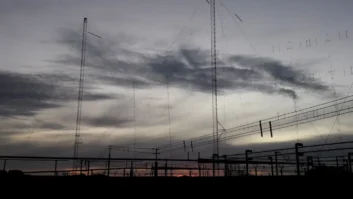
The vast BBC newsroom prepares content for the broadcaster’s many
program feeds, including BBC World Service. Photo: Hufton & Crow
OTTAWA, Ontario — At the height of the Cold War, the BBC World Service, Radio Canada International and the Voice of America used high-power, multilingual broadcasts on the shortwave radio bands (1710 kHz–30 MHz) to blast news and information behind the Soviet Union’s “Iron Curtain.”
In turn, Radio Moscow, Radio Havana Cuba and East Germany’s Radio Berlin International pumped their own versions of reality to the world via shortwave.
REDUCED BROADCASTS
Thanks to the nature of shortwave propagation, in which radio waves can bounce around the world by reflecting off the ionosphere, then off the ground and then the ionosphere again, these broadcasts got through.
Granted, because they were AM signals, their audio was scratchy and often interference-ridden; and even sometimes blocked by government “jammer” stations operating on the same frequencies. But nevertheless, eastern Europeans heard at least some of these international broadcasts.
In 1989, the Berlin Wall fell, followed two years later by the collapse of the Soviet Union. Soon after, the Internet caught on. Collectively, these forces demotivated governments from maintaining multi-antenna/multitransmitter shortwave transmitter farms, where power-hungry 50 and 100 kW AM transmitters guzzled electricity like frat boys downing kegs of beer.
The result is that international broadcasters have reduced their shortwave broadcasts in favor of the Web, or — in the case of RCI — abandoned shortwave entirely for the Web. RCI’s massive shortwave antenna and transmitter farm in Sackville, New Brunswick, which provided stellar coverage of Europe during the Cold War, has since been torn down.

WRMI’s transmitter facility. Photo: WRMI

Inside the facilities, 14 shortwave transmitters broadcast
about 175 hours of programming per day. Photo: WRMI
“It’s amazing how many of the major shortwave broadcasters have abandoned shortwave — completely or mostly — since the fall of the Berlin Wall,” said Jeff White, founder and general manager of Radio Miami International. WRMI is a United States-based commercial shortwave broadcaster, which covers the Americas, Europe and Africa via its 13-transmitter, 23-antenna facility located in Florida.
Mindful of radio’s continuing Third World popularity, the BBC and VOA have at least “maintained shortwave transmissions to places like Africa, the Middle East and parts of Asia and Latin America,” White said. “But some of them, including the Voice of Russia, have ended all shortwave transmissions. The large religious shortwave broadcasters have more-or-less followed suit.”

WRMI’s transmitter site in Okeechobee, Florida is located on a
one-square-mile cattle ranch. It is the largest privately owned
shortwave station in the Western Hemisphere. Photo: WRMI
SEVERAL ISSUES
There’s no doubt that money played a big role in the demise of international shortwave broadcasting, especially for cash-strapped governments.
“Shortwave transmitters are expensive to operate because of the electrical costs, and expensive to replace,” said Kim Andrew Elliott, an audience research analyst for the U.S. International Broadcasting Bureau (which runs the VOA), expressing his own views. In contrast, “The Internet is a cheaper way to transmit globally — unless the audience gets really big — the signal is more reliable, and stations don’t interfere with one another,” he said.
The Web has also caught on with government broadcasters because it’s considered cool. “The World Wide Web is sexy new technology,” said White. “So the station managers have been able to say to their bosses and governments that they have saved a lot of money by eliminating the ‘old technology’ of shortwave and replacing it with the new technology of the Internet.”
As well, broadcasters like the BBC World Service have moved to FM where it is possible to deliver better audio quality and signal reliability. “For many years, the BBC World Service has been broadcasting its services through its own FM relay transmitters and by providing programs to affiliates,” said Nigel Fry, head of distribution for the BBC World Service Group.
“The oldest FMs have been in service for over 40 years, with many more coming into service from 20 years ago to the present day as markets liberalize and licenses are secured.”
In swapping shortwave for the Web, these broadcasters have put their program delivery at the mercy of hostile governments who can block their Web-based content, just by disrupting their country’s Internet traffic.
That’s what recently happened in China, as the authorities tried to prevent their people from learning what actually happened 25 years ago in Tiananmen Square.
EASY TO BLOCK
“In an effort to prevent the dissemination of information related to this event, the Chinese censorship authorities have severely blocked most Google services in China, including search and Gmail,” said the China Web traffic watchdog Greatfire.org in a June 2 email to Bloomberg News. “Our gut feeling is this disruption may be permanent.”
It is relatively simple for authoritarian regimes to block websites they don’t like. But in fairness, shortwave radio broadcasts can also be blocked by “jamming” stations. “Some BBC World Service Internet services are blocked in specific countries — most notably in China,” said Fry. “The English shortwave broadcasts to China and the surrounding countries are also being jammed by the Chinese and have been for some time. Our Uzbek broadcasts are also jammed.”
There are ways that Web-based services can get past government blocking through software programs, at least as long as some Internet traffic is getting through.

VOA Radiogram text as received by a listener in Italy using the Fldigi
decoding software from w1hkj.com. Photo: Kim Andrew Elliott
For instance, “some international broadcasters are employing technologies such as Psiphon that circumvent the blocking of Internet content,” said Elliott.“The circumvention technologies are not infallible, however, and they may fail in the face of more vigorous interdiction. They certainly will not work if a country physically cuts off Internet lines bringing in foreign traffic, or slows them down to debilitating speeds.”
To meet this challenge, VOA has an experimental program underway called “VOA Radiogram.” In this program, the station broadcasts both text and photographic information via shortwave to listeners equipped with radio-connected computers.
“VOA Radiogram is an experiment to provide information to any place where the Internet, or at least content from abroad, is unavailable due to dictators, disasters, conflict, or remote location,” said Elliott, who is leading the effort. He said that the experiment has been very successful. “We tried various modes, including PSK, MT63 and Olivia, but MFSK (multiple frequency shift keying) has been the best performer. MFSK32, at 120 words per minute, provides a good compromise between speed and accurate copy under challenging shortwave reception conditions.”

Dr. Dowell Chow, president of Adventist World
Radio (l), and Terry Elders, facility manager at WRMI,
in front of log periodic antenna beaming to Cuba
and the Caribbean. Photo: WRMI RADIO RULES
Clearly, progress has been made in getting Web-based content into repressive countries. Nevertheless, White still sees shortwave radio as the delivery medium of choice for people living under authoritarian regimes; based on his own experience.
“For our audience in Cuba, for example, shortwave is the only way to get through,” he said. “Our WRMI listeners in Cuba [WRMI broadcasts in English and Spanish] write us and tell us this constantly. They beg us not to eliminate shortwave like so many of their other favorite stations have done in recent years.”
In recent years, an increasing number of these Cuban listener pleas have come to WRMI by email. “But as for listening to our webstream simulcast?” asked White. “So far, we have not received even one letter or email from a listener in Cuba who says they can listen to us on the Web!”
James Careless reports on the industry for Radio World from Ottawa, Ontario.
Related:












